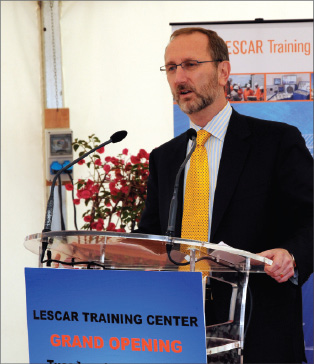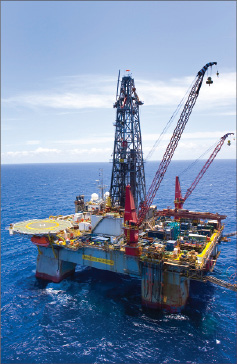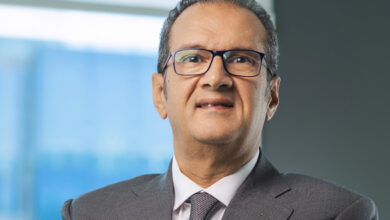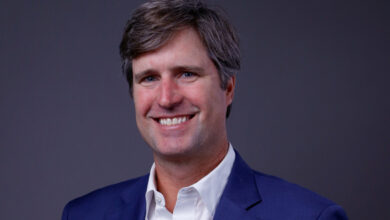2010 chairman profile: Louis Raspino, Pride International – Stronger with every step

By Linda Hsieh, assistant managing editor
“That which does not kill us makes us stronger” is an old saying that Pride International president, CEO and director Louis Raspino takes to heart. For him, market slumps are actually opportunities to make his company stronger, operationally and financially. This downturn has been no exception.
For example, in June 2009, Pride opened a nearly 14,000-sq-ft training facility in Lescar, France, a 2 million euro investment, to ensure that employees are well-prepared for real-life drilling operations. Then in August, the company completed the spin-off of Seahawk Drilling, which owned its mat-supported jackup rigs in the Gulf of Mexico. This was the finishing touch to a transformation Pride has been undertaking to make itself an exclusively offshore drilling contractor focusing on premium plays such as deepwater.
“Strategically, it was hard to focus on being the best in class in worldwide deepwater operations while also having to manage a very different type of asset in the US Gulf of Mexico,” Mr Raspino explained. “We’ve now invested over $3 billion in deepwater growth, and the company has been totally redefined. The market is beginning to recognize that by giving us more of a deepwater valuation.”
The downturn has also been a great opportunity for the company to sharpen its focus on financial discipline – something Mr Raspino takes very seriously. Now, the focus is on having the right people in the right place and concentrating on performance excellence.

Equally critical in a down market is the industry’s focus on safety and the environment, he emphasized, which must not waver if the industry wants to continue delivering value and performance to customers. As IADC’s 2010 chairman, Mr Raspino said, he hopes to lead the association by enhancing contractors’ cooperation with operators so that both sectors can work toward a better HSE record – because “our safety and environmental statistics are also their safety and environmental statistics.”
In the beginning
Although Mr Raspino didn’t have any direct contact with the energy industry while he was growing up, he recalls that it was pretty hard to live in New Orleans in the 1960s and ’70s without getting at least some exposure to the oil business. “It was the primary industry other than tourism, so it was something you paid attention to,” he said.
“And it always seemed like an exciting business – its worldwide reach, its importance to the global economy and the local economy, the associated geopolitical issues, the technical challenges – it just seemed like an exciting place to be.”
He received his bachelors degree in accounting from the University of New Orleans in 1973. Upon earning a Masters of Business Administration degree from Loyola University, Mr Raspino went to work for Ernst & Ernst (now Ernst & Young), doing public accounting, auditing and consulting for companies from a variety of industries. His primary clients, however, were from the energy industry, which gave him his first direct exposure to the business and helped him better understand how this industry works and what its challenges were.
In 1978, as the oil boom pushed toward its peak, Mr Raspino went to work for Louisiana Land and Exploration Company (LL&E), kicking off a two-decade career there that lasted until the company’s merger with Burlington Resources in 1997. During those 20 years, he did “almost everything you can do on the finance side of the organization,” from financial analysis, purchases and acquisitions, and special projects, to becoming the assistant treasurer, treasurer and finally senior vice president of finance and administration, and chief financial officer.
In 1998, following LL&E’s merger into Burlington Resources, Mr Raspino opted to leave the E&P side of the business and cross over to the service sector. He first went to Halliburton as vice president of worldwide finance, then to Grant Prideco as senior vice president and CFO. The difference he found in the service companies, compared with E&P companies, was startling.
“It is so much more volatile on the service side. There’s a lot more focus on cost, service delivery, customer satisfaction and performance excellence,” he said. As a whole, he also found that the service sector still lagged behind oil and gas companies in terms of management discipline.
E&P companies had gradually matured into highly disciplined and highly structured companies after the shock of the 1980s bust, he explained. “But when I got to the service industry, I thought it still had a ways to go in making that same transition,” he said, adding that part of his jobs at Halliburton and Grant Prideco was to bring in new ways of thinking and to implement more sophisticated management practices.
In late 2003, Mr Raspino was offered a position as executive vice president and CFO at Pride International – yet he almost didn’t take the job because he feared the drilling contractor industry would be “too simple.”
What possible challenges could a drilling contractor offer, he thought? After all, don’t they just “turn to the right”?
“I’m not the type of person who can go to work everyday in a boring industry where nothing is risky or exciting or threatening and everything is easy. It’s just not how I’m wired.”
Fortunately, he did decide to join Pride, and it didn’t take long for Mr Raspino to realize just how far this industry is from being “too simple.”
“The levels of operating complexity, infrastructure complexity, financial complexity and technical complexity are extreme. The people issues you have to manage when employees live in one part of the world and work in a far different corner of that world; the supply and demand factors you have to deal with; the safety discipline that’s required … quite frankly, I was surprised to learn just how really complex the business is from all factors,” he said.
Redefinition
More than these industry complexities, other challenges were also brewing at Pride when Mr Raspino came aboard in December 2003.
Through various acquisitions and joint ventures over the years, the company had amassed an array of valuable assets – hundreds of land rigs, shallow-water rigs, mid-water rigs, deepwater rigs, a rig construction business, an E&P services company and even a “floating hotel,” or accommodation unit, in the North Sea. Yet what did the company want to do with these assets? And what kind of drilling contractor did it want to become?
“The company had grown very quickly. Its size had outgrown its capital and management structures and needed a lot of strategic thought,” Mr Raspino said. “We needed a team to define a strategy. To do that, we had to step back and look at what we had at Pride. We had to figure out where we wanted the company to go in the future.”
The best place to be, they determined, was offshore – especially in deepwater. “We saw that deepwater is still an emerging growth area in terms of the geology. The industry has only begun to explore, drill and develop its potential. We believe that deepwater is where there are the best opportunities for impact discoveries,” he said.
Once a strategy was established and they knew where they wanted to go, they had to figure out how to get there.

First for Mr Raspino, management had to get employees to buy in to the new strategy and work together to implement it. “A big part of doing something like this is working with a team that believes in you as a leader, that believes in where you’re going and wants to go where you want to go,” said Mr Raspino, who tackled the challenge with discipline and determination. Systems and processes were re-examined and reorganized, and any assets that didn’t fit into the new strategy were divested; the proceeds were then methodically reinvested in assets that did fit in with the new strategic direction.
In just a few years, all the land rigs and shallow-water jackups are gone, while successful deepwater operations that were already in place in Angola and Brazil have been kept and enhanced with partner buy-outs. The company now boasts a strong presence in Africa and Brazil – key markets – with approximately seven drillships/semisubmersibles operating there in deepwater, and another four mid-water semisubmersibles combined in both regions.
The company also has invested in four ultra-deepwater newbuild drillships, under construction at the Samsung shipyard in South Korea. The Deep Ocean Ascension, Deep Ocean Clarion, Deep Ocean Mendocino and Deep Ocean Molokai will be able to drill in water depths of 10,000 ft to 12,000 ft and drill wells up to 40,000 ft. All will be dynamically positioned.
Three already have long-term contracts in place (two with BP and one with Petrobras). Upon delivery in 2010 and 2011, at least two of them will be going to work in the thriving US Gulf of Mexico deepwater. “That means we’ll have a significant presence in all parts of the deepwater golden triangle, and they will be our key operating regions in the coming years,” Mr Raspino said.
He adds that Pride is also looking at emerging deepwater markets, including India and Mexico. “We have seven independent-leg jackups in our fleet, and we’re putting most of those rigs to work in areas that will give us contact with customers that could develop into further relationships in deepwater.”
The people problem – it’s still there!
When commodity prices and the economy crash as fast and severely as they did in late 2008 and 2009, it’s understandable for companies to come down hard on spending. But if you’re cutting back significantly on hiring and training in this downturn – and Mr Raspino suspects that many companies are – then “they do so at their own risk.”
“We know the market is going to turn up again… and when it does, we’re going to feel just as panicked as we did a couple of years ago because everybody will be a couple of years older and closer to retirement. We have to work through this downturn by continuing to develop people,” he cautioned. “The industry can’t always count on finding talent in somebody else’s workforce. There just aren’t enough people.”
Pride is certainly not cutting back significantly on investments in people, Mr Raspino said. The company’s been recruiting and training crews for its newbuild rigs for some time now. Key supervisory and crew members are already in the shipyard with the first drillships, while others are working on existing rigs for training and skills development, he said.
Another example is the new Lescar training center. That facility features seven permanent instructors, a full-size simulator, a collection of drilling equipment students can dissect and repair, and a rig on top of a 3,000-plus ft test well so students can practice rig-floor and well control operations.
Mr Raspino believes that training centers like this are critical as the industrywide personnel shortage forces companies to put relatively inexperienced employees to work. Training centers provide a controlled environment so employees can make mistakes and, more importantly, learn from those mistakes.
“You can’t teach people the pit-in-your-stomach feeling when you make a mistake. That’s what teaches you not to make the same mistake again,” Mr Raspino explained, adding that Pride has plans to build another training center in Brazil.

The company is also developing a dual-track leadership development program, which began three years ago as a result of the demand for trained people. The program includes a technical track for people who love working on rigs and on rotations, and there’s another track purely for business management development.
“This industry tends to almost exclusively take drilling talent and move them to operations management. While this has been successful in many respects, I don’t think the industry has done enough to bring professionals from other disciplines into business management, and that’s something we’re working on right now,” Mr Raspino said.
He continued: “The industry still faces what I consider to be a very long-term crisis when it comes to having talent to run the industry. We must develop many leaders who don’t exist today.”
It’s a tough business
Other than its people problems, the industry also has tough challenges ahead that will demand innovative technological solutions and disciplined management. One of the toughest, Mr Raspino believes, is the volatility of commodity prices.
Low prices are obviously a problem since it impacts operators’ profit margins and therefore demand for rigs. But high prices can also be problematic, he said.
“As energy prices go up, it tends to attract speculative investments into our industry. That creates additional capacity, which affects the laws of supply and demand, which must be worked through in a downturn as we’re doing now,” Mr Raspino explained.
High commodity prices also tend to overexcite companies into hypergrowth, such as when oil prices were $100/bbl or higher. “It’s important to remain financially disciplined even in the face of that type of euphoria, and that means not overcommitting yourself to growth even when you have the short-term ability to do so. You have to remember: In the long term, things change.”
What makes things even more difficult is the fact that there’s nothing we can do to rein in this volatility because it’s driven by so many complex factors. “Volatility is just something we have to live with as an energy business,” he said.
In the near-term future, Mr Raspino believes that, with weak capital markets, growth forecasts will be much more measured, which might at least keep volatility from reaching such extreme levels as was seen in 2008. Plus, “seeing how fast an energy cycle can go from the top to the bottom has once again awakened people to the risks in this business.”
Still, Mr Raspino is extremely optimistic about the industry’s near-term and long-term outlook, especially for those companies with a strong balance sheet. Appearing on CNBC’s “Power Lunch” program on 30 July 2009, he noted that while the global economy is still deep in recession, the oil industry has already “passed” the bottom.

For months now, crude oil prices have been nowhere near the bottoms of $30s or $40s, staying within the $70s range – a price many would agree is quite healthy. “I think we’re at a point now where customers are coming out of their cocoons, where everybody has been the last year. They’re looking around and seeing that the world still has numerous investment opportunities at $70 or $75 oil.”
The fact that oil is a depleting commodity base in a world of growing demand also doesn’t get lost on people, which helps support prices, he said.
Industry cooperation
In the future, Mr Raspino hopes that the industry can find better ways to work with its customers so that drilling contractors are seen as more than just an asset that turns to the right. Rather than operators hiring contractors just to make hole, operators and contractors should collaborate as partners in order to reduce the total cost of drilling.
This is where IADC can make a difference, he said.
For decades, the association has been a forum where contractors – land or offshore, big or small – can get together to exchange ideas and discuss developing trends, technologies and challenges. In recent years, IADC has stepped up its efforts to get oil and gas companies, including national oil companies and host governments, more involved in these discussions as well. Operator participation in IADC conferences/workshops, committees and accreditation projects has been on the rise, and Mr Raspino hopes to push that trend even further during his 2010 chairmanship.
Especially in the areas of safety and the environment, he believes IADC can help bring operators and contractors together. “Operators care, and they’re serious. We need to demonstrate as an industry that we also care and are serious,” he said. “I don’t care how good we become, it’s never enough and we’ll always want to improve. We’re going to be putting a lot of undivided attention to continuous improvement in safety.”
Mr Raspino and his wife, Cheryl, have been married for 36 years. They have two children – daughter Christine lives in New York City and works in media and fashion, and son Michael is an attorney in Houston.





Dear Mr. Raspino,
Congratulations for your achievements in developing offshore drilling business in Brazil.
I am a native Brazilian, and U.S. Citizen (I kept my Brazilian citizenship too), residing in Houston.
I have 20+ years of verifiable & successfull International management experience in oilfield logistics.
Recently, I was the Shore Base Manager for the PNA, when drilling offshore Abu Kir in Egypt (2008)(BP/Nalpectco) and Cadiz and Tarragona in Spain.
I am presently available in Houston, thus, would like to know if I can be usefull for your campaing in Brazil.
Sincerely,
Moises Oliveira
281 382 1479
Offshore jobs are more of a lifestyle. They are not everybody, since they involve long and tiring hours at the oil rigs away from your friends and family and often working under tough weather conditions.
Some may find such a job hard and unattractive, but other may find it exciting and interesting. For the latter ones offshore jobs offer generous rewards in the form of salaries that are clearly above market wages.